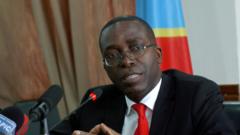Augustin Matata Ponyo, the ex-DRC prime minister, has been sentenced by the Congolese Constitutional Court to ten years of hard labor for the embezzlement of approximately $245 million from public funds linked to essential agricultural projects. His co-defendant, former central bank governor Deogratias Mutombo, has been sentenced to five years of forced labor. The court's decision, described by Matata's lawyer as politically motivated, marks the culmination of an investigation into the financial misconduct that began in 2020. This scandal occurred amid ongoing crises in the DRC, where millions experience severe food insecurity, exacerbated by decades of conflict and instability.
**Former DRC Prime Minister Sentenced to Forced Labour for Corruption**

**Former DRC Prime Minister Sentenced to Forced Labour for Corruption**
A significant legal ruling in the Democratic Republic of Congo (DRC) sees its former prime minister receiving a harsh punishment for corruption charges.
The ruling and implications of this case are critical at a time when political tensions are rife, particularly following Matata's recent campaign efforts against President Felix Tshisekedi in the 2023 elections. Both Matata and Mutombo have been barred from public office for five years following their sentences, and the case has drawn attention not only for the legal ramifications but also for its potential impact on governance and accountability in the DRC.
The Bukanga-Lonzo Agro-Industrial Park, from which the funds were reportedly embezzled, was initially heralded as a transformative agricultural investment for the country, highlighting the tragic waste of resources intended to alleviate food shortages affecting 28 million Congolese citizens. The incident underscores the persistent issues of corruption that plague the DRC, raising questions about the mechanisms in place to protect public funds and aid the struggling populace.
Examining this verdict, various perspectives emerge: supporters of the ruling advocate for accountability in a nation beset by endemic corruption, while detractors argue that it's an example of political repression against opponents of the current government. As the DRC navigates its future, the long shadows of past governance decisions continue to inform the current political landscape.
The Bukanga-Lonzo Agro-Industrial Park, from which the funds were reportedly embezzled, was initially heralded as a transformative agricultural investment for the country, highlighting the tragic waste of resources intended to alleviate food shortages affecting 28 million Congolese citizens. The incident underscores the persistent issues of corruption that plague the DRC, raising questions about the mechanisms in place to protect public funds and aid the struggling populace.
Examining this verdict, various perspectives emerge: supporters of the ruling advocate for accountability in a nation beset by endemic corruption, while detractors argue that it's an example of political repression against opponents of the current government. As the DRC navigates its future, the long shadows of past governance decisions continue to inform the current political landscape.




















